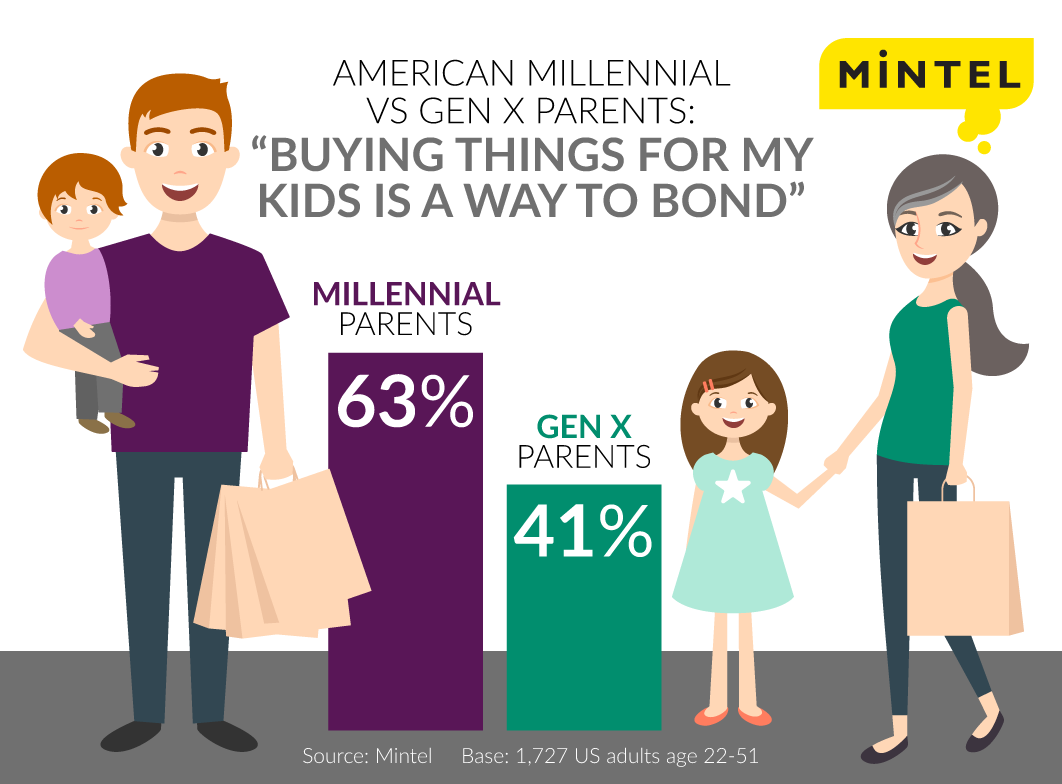53% of US parents agree that buying things for their kids is a way to bond
You may not be able to buy love, but American parents are paying to bond with their kids: new research from Mintel reveals that despite 57 percent of parents* worrying about spoiling their kids, over half (53 percent) agree that buying them things is a way to bond. What’s more, 63 percent of parents prefer to shop with their children.
44% of parents give their kids more of a say in family decisions than they had as a child
Overall, 53 percent of parents say “yes” more than half of the times that they are asked by their children to buy things, and one third (31 percent) are afraid that their kids will make a scene if they say “no” to buying them something. While some parents fear their child’s reaction to being told “no,” many are open to saying “yes” because of the shift toward a more democratic parenting approach. In fact, 44 percent of parents give their kids more of a say in family decisions than they had as a child, while 45 percent say they are more generous with their kids than their parents were with them. These attitudes may contribute to a stronger family bond, as nearly half (46 percent) of parents agree that they are closer with their kids than they were with their own parents as a child.
“Traditionally, families employed a ‘top-down’ structure with parents in charge and children as subordinates. However, modern families have a less strict structure in which children are given more influence. And yet, a majority of parents are worried about potentially spoiling their kids,” said Fiona O’Donnell, Category Manager, Multicultural, Lifestyles, Leisure and Travel at Mintel. “This shift is great news for brands, which can look to leverage kids as influencers, as parents give serious consideration to their children’s preferences and opinions after not having as much of a say in family decisions when they were growing up.”
Mintel research reveals that, among parents, Millennial dads are most likely to have a soft spot for their children and are more susceptible to their influence. Indeed, Millennial dads (74 percent) are much more likely than Millennial moms (53 percent) to agree that buying things for their children is a way to bond. In comparison, just 41 percent of Gen X moms and dads agree that buying things for their kids is a way to bond. What’s more, four in five (80 percent) Millennial dads prefer to shop with their kids (vs 60 percent of Millennial moms), while 53 percent of Gen X parents share this preference.
Millennial dads (72 percent) are also more likely than Millennial moms (56 percent) to agree that their kids help keep them up-to-date on what is trendy. This is in line with Mintel research which indicates that Millennial parents (60 percent) are significantly more likely than non-parents (38 percent) to say they like to be one of the first to buy new/trendy products.
“Our research shows that Millennial dads stand out as being more receptive to their children’s suggestions. Not only do they see purchases as a way to strengthen bonds with their kids, but Millennial dads also see time spent with their kids as a way to stay on top of trends. Brands should concentrate marketing efforts on products and services that can be enjoyed by both parents and children, while being especially considerate of Millennial dads’ mindsets,” continued O’Donnell.
Mintel research reveals that kids have a say in both day-to-day and big-ticket purchases. Four in five (79 percent) parents say their kids influence what the family watches on TV, and three quarters (74 percent) say kids influence where they dine out. The majority of parents agree their kids are involved in decisions for more expensive, long-term purchases, such as gaming consoles (71 percent) and video games (78 percent). As they involve their children in the purchasing process, 63 percent of parents agree that their kids know the value of a dollar.
“Our research shows that children are getting a say in the matter when shopping, even for big ticket items. Allowing children to have an influence when shopping is a teaching opportunity for parents; involving their kids can be seen as a way to teach them how to make good decisions and develop financial acumen from an early age,” concluded O’Donnell.
*Mintel surveyed parents with children under age 18 living at home
Press copies of the Kids as Influencers US 2016 report and interviews with Fiona O’Donnell, Category Manager, Multicultural, Lifestyles, Leisure and Travel, are available on request from the press office.
For the latest in consumer and industry news, top trends and market perspectives, stay tuned to Mintel News featuring commentary from Mintel’s team of global category analysts.
-
Mintel StoreGet smart fast with our exclusive market research reports, delivering the latest data, innovation, trends and strategic recommendations....View reports
-
Mintel LeapMintel Leap is a revolutionary new AI-powered platform that will transform your research process....Book a demo








































